
Henry Kissinger died last evening, too late in the day for American cartoonists to do more than replay some of their previous commentaries on the man. Steve Brodner‘s cover for Nation was only a few months ago, on Kissinger’s 100th birthday, and his dripping blood frosting offers a Reader’s Digest guide to the doctor’s accomplishments, for anyone who came in late.
Kissinger was associated with Realpolitik, which either translates to pragmatism or war crimes, depending on your perspective. The NY Times headlined their obituary “Henry Kissinger Is Dead at 100; Shaped Nation’s Cold War History” (gift link) while Rolling Stone chose to call theirs “Henry Kissinger, War Criminal Beloved by America’s Ruling Class, Finally Dies.“
That likely defines the spectrum of what we can expect to see in obituaries, both politically and because it would be hard to fall past either end.
Cartoonists have apparently not read the “De mortuis nil nisi bonum” memo.

David Rowe is predictably out of the blocks quickly, and it’s not a breakthrough piece but it does sum up Kissinger’s complicated legacy, though people who say “Oy” generally don’t believe in a Final Judgment/Pearly Gates post-mortem fate. His fellow Aussie, Glen Le Lievre, has a cartoon with a more definitive judgment, but it’s embargoed for 48 hours.

While, in England, Christian Adams is considerably more ambivalent, requiring viewers to read between the lines, albeit with Kissinger’s glasses, which, in my experience, produced their own particular focus on things.

In this country, Dr. MacLeod got out a quick but pointed commentary, thanks, I suspect, to whatever government group compiled records of the post-Khmer Rouge investigations in Kampuchea, though, unlike the Khmer Rouge, he didn’t shoot anyone. But he directed the carpetbombing which helped the Khmer Rouge come to power.
By the way, O Best Beloved, you may hear a Kissinger quote that “Power is the great aphrodisiac.” Well, he said a lot of things. But he was once romantically linked to Jill St. John, and you should also know that we didn’t understand it at the time, either.

Though in 1984, David Levine depicted him unleashing his romantic proclivities on the entire world.

While Jeff Danziger resurrected the power quote in 2016 when Dr. Kissinger was invited to become one of Hillary Clinton’s advisors. Politics do indeed make strange bedfellows.
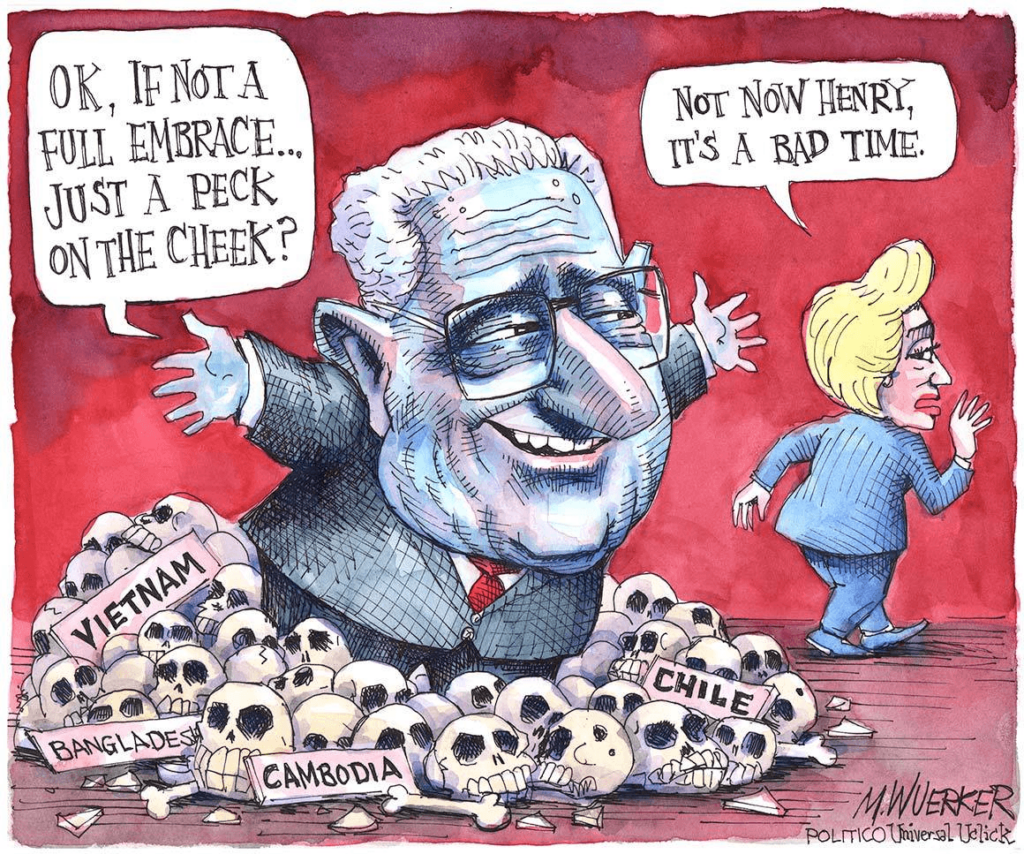
Though Matt Wuerker (Politico) suggested that she soured on him somewhat, perhaps because she and Bill had been opposed to his policies once upon a time long ago.

Lord knows he did go back a long way, and had advised Nixon through the opening of China, as Tom Englehardt noted.
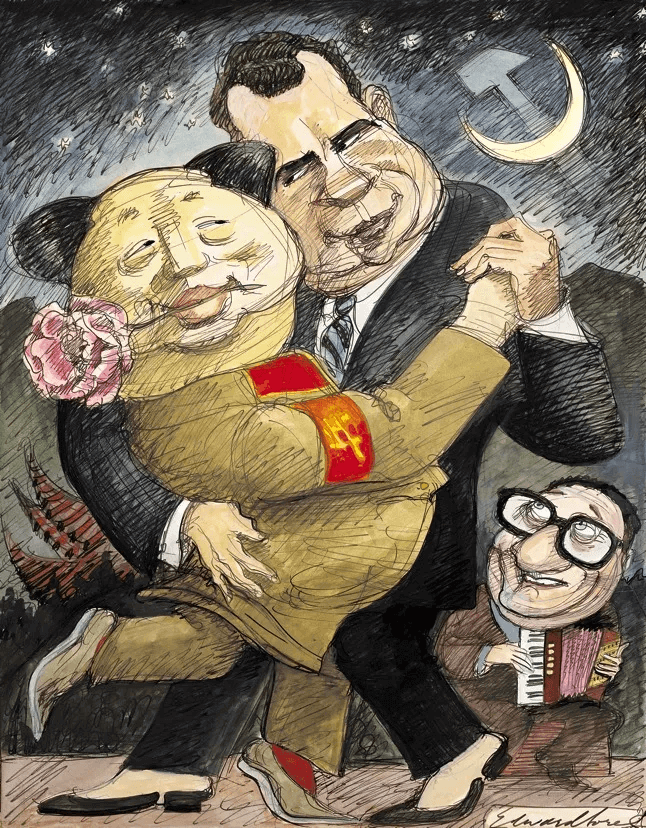
Ed Sorel provided a more colorful view of the affair.

And Herblock pointed out his role not only in that, but also in the Paris Peace Talks of roughly the same era, a time in which he spent a lot of time on airplanes while, as Herblock suggests, he was also lost in diplomatic jungles.

By the time of the Mayaguez Incident, Nixon was gone and Ford was in the White House, and, as Bill Mauldin noted, so was Henry Kissinger.
Incidentally, I’ve often mentioned a Green Beret friend who was in Cambodia during the war, advising montagnards in obstructing the Ho Chi Minh trail. At about the time of the Mayaguez Incident, the ‘yards were advised to go to the seacoast to be evacuated, but the American ships never showed up. The Khmer Rouge, however, did.
There was a lot of that there Realpolitik going around in the wake of the war.

And his influence didn’t fade with the end either of the war or of Nixon. As Paul Conrad noted in 1983, Dr. Kissinger was appointed to seek peace in Central America. I would suggest that this is not a depiction of a passenger jet, despite the amount of frequent flyer miles Kissinger was accruing.
Rather, it was more of that Realpolitik, a reminder of why it was in everyone’s best interest to listen when Henry Kissinger spoke.
Juxtaposition of the Day
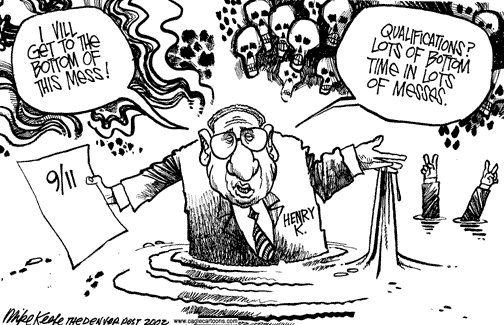
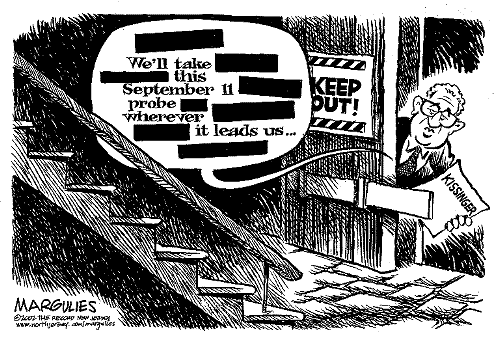
In 2002, the old boy was dusted off and assigned to investigate the 9/11 attacks, and you can see that Keefe and Margulies were both convinced he’d get to the bottom of it and report the facts to the American people.
Which reminds me of the African folktale of the lion who discovered that, in his absence, his cub had been crushed to death. The other animals told him it was the elephants who had done it, but he looked the gigantic beasts over and said, “No! It was the goats!” and proceeded to wreak his vengeance on them.
But I digress. Or maybe I don’t.
Juxtaposition of the Day #2
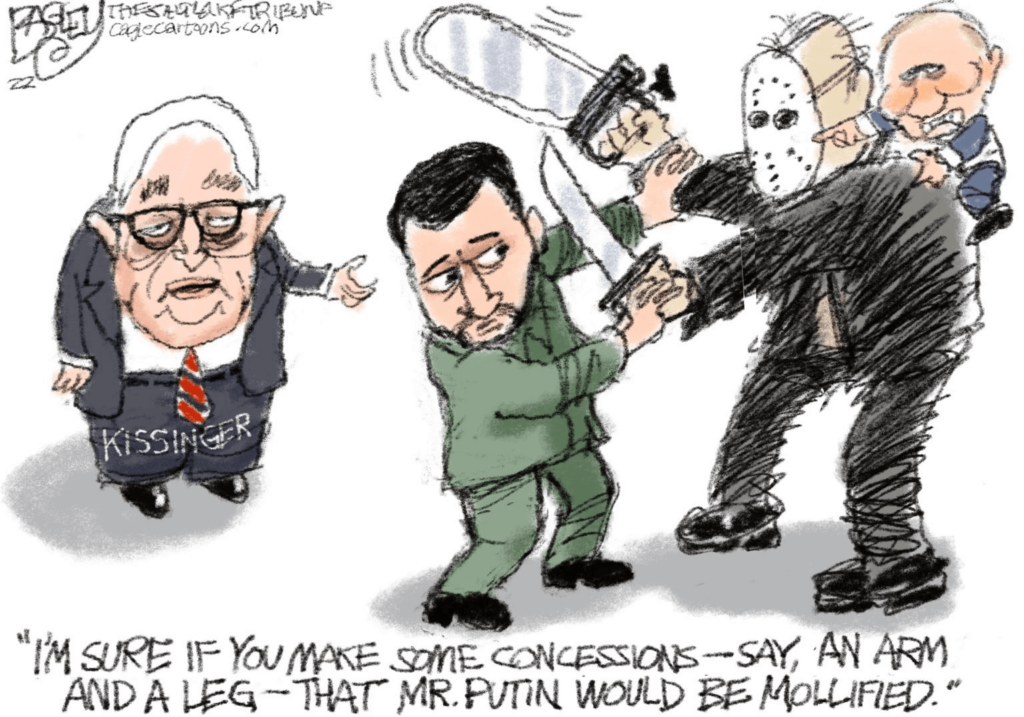
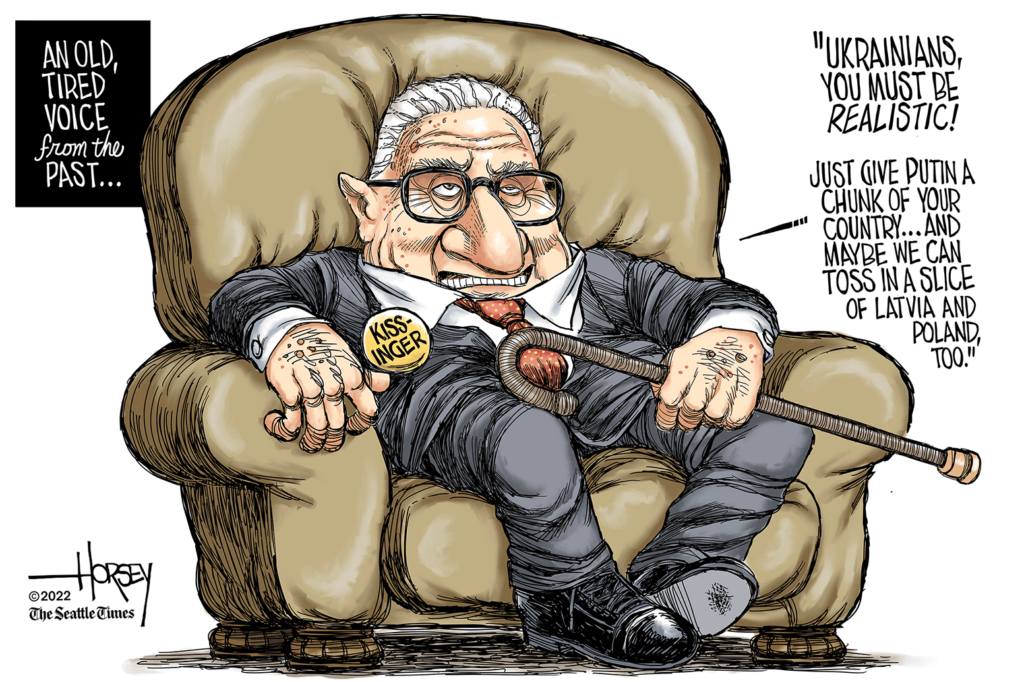
When he was asked his opinion of the Russian … um … incursion of 2022, the Realpolitik apparently swung the other direction, Bagley and Horsey suggest, and the old anti-communist warhorse had suddenly discovered the marvels of diplomatic compromise.
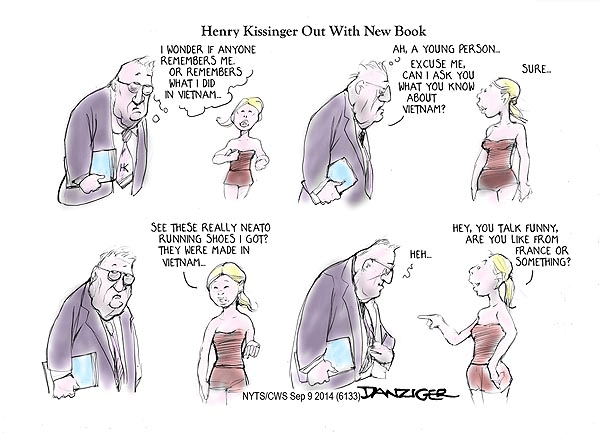
In 2014, Jeff Danziger suggested that the old fellow had been forgotten.
Well, maybe the young folks have never heard of him. The old folks haven’t forgotten, as I’m sure a number of cartoons and columns will reveal in the coming days.
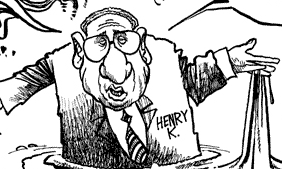
Dan Kennedy shared in a post on Media Nation an overview he wrote in 1981 about Christopher Hitchens 40,000-word essay about Kissinger in Harper’s magazine. One item he pulled from Hitchens’ list of Kissinger’s misdeeds was in a post the following:
“ During the 1968 presidential campaign, Kissinger, a Democrat, was working as a low-level functionary for the Johnson White House, assisting with peace talks with the North Vietnamese in Paris. Kissinger leaked word to the Nixon campaign that Lyndon Johnson was considering a last-minute bombing halt to help the presidential campaign of Hubert Humphrey. Nixon’s minions, in turn, made use of that intelligence to pass messages to the South Vietnamese to hang tough, telling them they would get a better deal from Nixon than they would from Humphrey. Sadly, it worked …”
I knew that Nixon had made use of that information, but not how it came to his attention.
https://dankennedy.net/2023/11/30/was-henry-kissinger-a-war-criminal-more-than-20-years-ago-christopher-hitchens-submitted-his-brief/#more-44815
Sorry for the garbled syntax. Second sentence should read: One item he pulled from Hitchens’ list of Kissinger’s misdeeds was the following
Levine’s brings to mind Dick Guindon’s immortal /Realist/ cover from 1962: https://i0.wp.com/comicsgrinder.com/wp-content/uploads/2012/12/dick-guindon-the-realist-nov-1962.jpg
I admire how quickly you must have pulled this column together–unless, like the other great journalistic institutions, you had a Kissinger obit done in advance because hey, who makes it past 100?
I’ve never been a fan of the hypocrisy of “De mortuis nil nisi bonum” but will meet it halfway, acknowledging that even the worst of us probably had people who love us and will grieve our deaths, so sometimes it’s best to say nothing. It is interesting to me that Kissinger is getting the kind of full accounting in death that he mostly skirted in life. His fingerprints are all over a half century of US foreign policy that we’re still grappling with.
“Realpolitik apparently swung the other direction, Bagley and Horsey suggest, and the old anti-communist warhorse had suddenly discovered the marvels of diplomatic compromise.”
Hardly. It’s remarkable how many people are incapable of distinguishing “Russian” and “communist”, but also how few of them are conservatives. Now that Russia is a fascist autocracy, of course Kissinger would go to bat for them. And them him.
True that. Kissinger may have been anti-communist but Putin’s Russia is hardly communist.
There are virtually no nations that are truly communist anymore. Even China is a blend, but the central government in both countries has far more control over “private” enterprise than is found in Western nations and the notion of supply-and-demand is very, very poorly understood — much less practiced — in those countries. Granted, in Russia, much of the control is from oligarchs rather than the politburo, but in practical terms, whether it is an official bureaucratic control or behavior enforced by fear of defenestration is barely a semantic difference.
Some thoughts on “de mortuis…” from A.R Moxon:
This isn’t as much celebrating a death as mourning a life.
Some use their lives to ensure that many who might have lived would die.
Such lives become something worth mourning, and their ends are a relief the victims will celebrate. So be it.
We write our obituaries in life, not in death. Live a life that caused mourning, and your life’s end will be a celebration.
If, at the passing of a person who made themselves monstrous, you would honor humanity, honor the humanity of the victims of that monstrous life.
https://www.threads.net/@julius.goat/post/C0QNlmfMClV
Good riddance
Amen!
Mike, thank you for your accurate assessment: ‘There are virtually no nations that are truly communist anymore. ‘
So many people have no idea what the forms of government really mean conceptually. They just grab a ‘title’ and sling it around at the public like a dead cat. The Orange Menace keeps lumping communist, socialist, leftist, etc. together just looking for a ‘strong’ pejorative term, as do so many others.
I lost a lot of dear friends and we lost a functioning South America due to Dr. K’s ‘valued’ influence, advice and direction. I will say something good about his death: Kissinger’s dead, good!